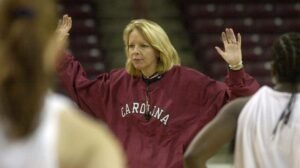BreakingNews:No.1 Player in America Commits to Kentucky Wildcats in Recruiting Shockwave due to…

BreakingNews:No. 1 Player in America Commits to Kentucky Wildcats in Recruiting Shockwave due to…

The announcement that the No. 1 player in America has committed to the Kentucky Wildcats has sent shockwaves through the entire college football landscape, rewriting the script of what many thought possible for a program historically overshadowed by the titans of the Southeastern Conference. For years, Kentucky has fought to carve out respect on the football field while living in the shadows of its basketball dynasty, but this commitment marks a turning point unlike any other. It is not simply a recruiting win—it is a cultural earthquake, a seismic statement that the Wildcats are no longer just participants in the SEC arms race but are genuine contenders capable of standing shoulder to shoulder with the most decorated programs in the nation. The sight of the nation’s top prospect donning Kentucky blue for the cameras will be etched into the memory of fans for decades to come. Recruiting analysts who spent months projecting the young star’s decision had largely penciled him in to powerhouse programs with long track records of national titles, NFL pipelines, and blueblood traditions. Alabama, Georgia, Ohio State, and Texas were all believed to have the upper hand, but as the player began to speak, describing his journey, his values, and his vision, the air in the room shifted. When he finally declared, “I am committing to the University of Kentucky,” gasps turned into cheers, and those watching knew they were witnessing a historic moment. In living rooms across Kentucky, fans erupted into celebrations. This was more than a football decision—it was validation. Big Blue Nation, a fan base often described as loyal to the point of obsession, has endured decades of mediocrity on the gridiron, flashes of competitiveness interrupted by long stretches of irrelevance in the national picture. But now, with the No. 1 player in America choosing to call Lexington home, the Wildcats are no longer outsiders; they are players on the biggest stage. The ripple effect of this decision will echo for years. Recruiting momentum in college football is a fragile thing, often swayed by perception as much as reality. If the best player in the country believes in Kentucky, others will follow. Already, social media has been flooded with responses from other recruits, many of them highly ranked prospects who are now openly reconsidering their plans. The domino effect has begun, and Kentucky’s recruiting class, once seen as promising but not elite, suddenly looks like it could finish among the top three nationally. This is how programs are transformed, how dynasties are built—not through single victories on the field, but through landmark recruiting wins that signal a change in trajectory. For head coach Mark Stoops, this moment is the pinnacle of a long, patient climb. Since taking over the program, Stoops has been methodical, building Kentucky into a tough, disciplined team that could compete with the SEC’s elite on any given Saturday. He has developed NFL-caliber players, raised the program’s floor, and instilled a culture of belief. But until now, Kentucky had never truly broken through the recruiting glass ceiling. They had landed talented four-star recruits, flipped players from regional rivals, and even produced draft picks who exceeded expectations, but landing the No. 1 player in America is something entirely different. It is the kind of victory that places Stoops and his staff in the national spotlight and forces the rest of the college football world to reevaluate what Kentucky is capable of achieving. The player himself brings with him not just hype but substance. Standing as a physical marvel with elite speed, power, and football IQ, he has been described by scouts as a generational talent, the kind of athlete who can anchor a program and change games single-handedly. Whether lining up on offense, defense, or special teams, he commands attention and alters game plans. Defensive coordinators will be forced to adjust, offensive coordinators will try to scheme around him, and opposing fans will dread seeing him in Kentucky blue. The Wildcats are not just gaining a recruit—they are gaining a game-changer who elevates the ceiling of the entire program. For the SEC, this is both fascinating and unsettling. The conference has long prided itself on being home to the best of the best, but usually those talents concentrated in a handful of programs: Alabama, Georgia, LSU, Florida, sometimes Auburn or Texas A&M. Kentucky, while respected as a tough out, was rarely in the conversation for the nation’s absolute elite. Now that has changed. This commitment forces rivals to recognize Kentucky not just as a spoiler but as a genuine threat. The Wildcats’ games will be circled on calendars, their highlights will be broadcast on national networks, and their recruiting pitches will carry a new level of credibility. National analysts have already begun speculating about what this means for Kentucky’s future. Some believe it could propel the program into contention for SEC championships, while others argue it might be a one-time anomaly. But history suggests otherwise. Once a program proves it can land the biggest fish, it rarely goes back to swimming in shallow waters. The aura of this commitment will linger, shaping perceptions for years to come. Even if the Wildcats never land another No. 1 player, the fact that they did it once will remain a powerful selling point for recruits, boosters, and fans alike. For the player, the decision also represents a deeply personal choice. During interviews, he spoke about the trust he felt with Kentucky’s coaching staff, the family atmosphere in Lexington, and the chance to leave a lasting legacy. At Alabama or Georgia, he might have been another cog in a championship machine; at Kentucky, he has the chance to be the cornerstone of something revolutionary. The appeal of carving out a unique place in history, of being remembered as the player who elevated Kentucky into national prominence, proved too powerful to resist. It is a narrative that resonates not just with him but with fans who long to believe in something greater than incremental progress. The commitment also shines a light on the changing nature of college football. With NIL (Name, Image, Likeness) opportunities now a central part of recruiting, players have more freedom than ever to choose programs that offer the right balance of exposure, development, and financial support. Kentucky, with its passionate fan base and growing infrastructure, was able to present a compelling package that went beyond tradition and trophies. They offered a vision of the future, a chance to be the face of a program on the rise, and the No. 1 player in America bought into it wholeheartedly. Rival coaches will no doubt dissect every element of Kentucky’s pitch, trying to understand how the Wildcats pulled off such a monumental upset. But the truth may be simpler than they want to admit: Kentucky believed, and their belief resonated. The program has spent years building credibility, and when the moment came, they seized it. The result is a commitment that has redefined what is possible in Lexington and left the rest of college football scrambling to catch up.




